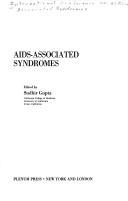Book
Year: 1985 Publisher: [S.l.s.e.]
Abstract | Keywords | Export | Availability | Bookmark
 Loading...
Loading...Choose an application
- Reference Manager
- EndNote
- RefWorks (Direct export to RefWorks)

ISBN: 0306420163 Year: 1985 Publisher: New York London Plenum Press
Abstract | Keywords | Export | Availability | Bookmark
 Loading...
Loading...Choose an application
- Reference Manager
- EndNote
- RefWorks (Direct export to RefWorks)
Book
ISBN: 9289020512 Year: 1987
Abstract | Keywords | Export | Availability | Bookmark
 Loading...
Loading...Choose an application
- Reference Manager
- EndNote
- RefWorks (Direct export to RefWorks)
Book
ISBN: 9051301871 Year: 1995 Publisher: Brussel Koning Boudewijnstichting
Abstract | Keywords | Export | Availability | Bookmark
 Loading...
Loading...Choose an application
- Reference Manager
- EndNote
- RefWorks (Direct export to RefWorks)
AIDS (acquired immune deficiency syndrome) --- Sociology of health --- Infectious diseases. Communicable diseases --- AIDS --- SIDA
Book
ISBN: 9060098196 Year: 1987 Publisher: Amsterdam : Boom Meppel,
Abstract | Keywords | Export | Availability | Bookmark
 Loading...
Loading...Choose an application
- Reference Manager
- EndNote
- RefWorks (Direct export to RefWorks)
Fonds Suzan Daniel (FSD)
Book
ISBN: 904510248X Year: 2005 Publisher: Amsterdam Em. Querido's Uitgeverij B.V.
Abstract | Keywords | Export | Availability | Bookmark
 Loading...
Loading...Choose an application
- Reference Manager
- EndNote
- RefWorks (Direct export to RefWorks)
Book
ISBN: 9789460914362 9789460914355 Year: 2011 Publisher: Rotterdam SensePublishers
Abstract | Keywords | Export | Availability | Bookmark
 Loading...
Loading...Choose an application
- Reference Manager
- EndNote
- RefWorks (Direct export to RefWorks)
This book presents the results of a study that examined the multiple layers of stigma and discrimination experienced by women infected and affected by HIV/AIDS in a low socio-economic area of Mumbai, India. Using exploratory qualitative methods and underpinned by the psychosocial framework and gendered perspectives the study attempts to represent the voicesof affected and infected women. The book first focuses on a global overview of HIV,presents data on the Indian context and provides a synthesis of HIV in relation to stigma, discrimination and gender. The second part of the book probes the depth of impact on women's lives using the lenses of gender, economic status, the environment and physical health. The framework was further modified and extended to include threats revealed by and strengths indentified in infected and affected women. The analysis revealed that strategies to address stigma and discrimination need to address the social, cultural, religious and systemic barriers to changing attitudes. The book portrays the resilience of each woman's spirit and the unique capacity of the women to cope, to find strength, to pursue life and to maintain hope when their dreams and the dreams of their children have been shattered through HIV/AIDS.
Sociology of education --- HIV infecties --- vrouwen --- AIDS (acquired immune deficiency syndrome) --- onderwijssociologie
Book
Abstract | Keywords | Export | Availability | Bookmark
 Loading...
Loading...Choose an application
- Reference Manager
- EndNote
- RefWorks (Direct export to RefWorks)
Book
ISBN: 9781597450850 Year: 2006 Publisher: Totowa, NJ Humana Press Inc.
Abstract | Keywords | Export | Availability | Bookmark
 Loading...
Loading...Choose an application
- Reference Manager
- EndNote
- RefWorks (Direct export to RefWorks)
Despite significant pharmacological advances, the backbone of the most highly active antiretroviral therapy regimens for controlling HIV/AIDS is still a combination of reverse transcriptase inhibitors (RTIs) first discovered in the late 1980s. In Reverse Transcriptase Inhibitors in HIV/AIDS Therapy, leading experts in AIDS/HIV drug discovery and development review all aspects of RTIs (nucleosides, nucleotides, and non-nucleosides), including drug discovery, pharmacology, development of drug resistance, toxicity, and prevention of mother-to-child transmission of HIV/AIDS. The authors synthesize our current understanding of the role of reverse transcriptase in the viral life cycle, describe the discovery and development of eight nucleoside and nucleotide analogs that represent milestones in treatment history, and thoroughly discuss the question of toxicity and resistance to this class of drugs. They also address three non-nucleoside RTIs and their pharmacokinetics and comparative clinical efficacy, new RTIs currently under development, and the impact of approved agents on treatment in general, and on vertical transmission in the developing world. Highlights include a thorough discussion of side effects, resistance, and treatment in the third world. Comprehensive and up-to-date, Reverse Transcriptase Inhibitors in HIIV/AIDS Therapy offers a magisterial survey of the discovery, clinical development, current use, and future possibilities of all drugs that treat HIV/AIDS by inhibiting the viral reverse transcriptase.
Digital
ISBN: 9781597450850 Year: 2006 Publisher: Totowa, NJ Humana Press Inc
Abstract | Keywords | Export | Availability | Bookmark
 Loading...
Loading...Choose an application
- Reference Manager
- EndNote
- RefWorks (Direct export to RefWorks)

 Search
Search Feedback
Feedback About UniCat
About UniCat  Help
Help News
News